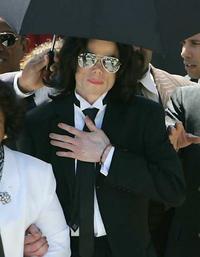
Michael Jackson after the verdict.
Photo: AP
Jackson's dirt-diggers made the difference
By Megan Garvey and Jean Guccione
Los Angeles

Michael Jackson after the verdict.
Photo: AP
Private investigators played a key role in discrediting the accuser's family.
Michael Jackson spent millions on his defence against child molestation charges. But a day after he was acquitted on all charges, legal experts said it was the more than $US350,000 ($A458,000) he reportedly paid for private investigators that may well have made the crucial difference.
The funds allowed Jackson to do what wealthy defendants in many high-profile cases have done - essentially complete a parallel investigation with the same care and thoroughness of a law enforcement agency.
So while Santa Barbara County prosecutors and sheriff's detectives focused considerable resources on Jackson, the pop star's private investigators were able to commission an exhaustive examination of the mother of Jackson's accuser.
The private eyes dug up embarrassing details about the mother's past that jurors on Monday said damaged her credibility and harmed the prosecution's case.
Many defence lawyers now consider that, far from a luxury, investigators are a crucial partner, so much so that some lawyers have been known to dip into their own fees to pay them.
"They can make or break you," said lawyer Mark Geragos, whose high-profile cases have included Scott Peterson, who was found guilty of murdering his pregnant wife Lacy, Winona Ryder and, briefly, Michael Jackson.
"When they talk about the best defence that money can buy, they talk about that in a disparaging way," said Donald Re, one of the lead defence lawyers in the late John DeLorean's 1984 acquittal on federal drug trafficking charges.
"But what that really means is having good experts and good investigators and a good attorney."
Mr Re said the best investigators turned up leads and witnesses so quickly that it had taken him aback.
In one case, he recalled that it took a private investigator only three hours to track down a potential witness with only the name of the street he supposedly lived on and that he worked at a panel-beating business. The man went on to be a key defence witness.
The investigation of the mother's background turned up evidence of welfare fraud."
He said that even on a "run-of-the-mill" criminal case, investigators probably would charge between $5000 and $10,000. Top-notch investigators cost more than $100 an hour.
Jackson's defence team was able to hire at least two investigators, who developed their own leads and followed up media reports. The top priority of the defence investigation, said veteran private detective Scott Ross, was finding out everything possible about the family of the boy accusing Jackson of molestation.
"One thing just leads to another," said Mr Ross, "and sometimes it leads to dead ends and sometimes it leads to gold."
The pay-off this time was a portrait of a mother, and family, so devastating that jurors said there was no way they could convict.
Mr Ross said he was able to persuade comedian Chris Tucker to testify that the family had tried to scam him. Private investigator Eric Mason, who preceded Mr Ross on the case, looked into the mother's $150,000 settlement with the retail chain J. C. Penney after she claimed she had been roughed up and sexually assaulted by security guards.
Perhaps most significantly, the investigation of the mother's background turned up evidence of welfare fraud, something a lawyer working for Jackson reported to prosecutors in Los Angeles. The allegations of welfare fraud forced the mother to take the Fifth Amendment when she took the stand.
"A good investigator thinks about cases differently than a good lawyer," said Harland Braun, whose high-profile cases include representing Los Angeles police officers charged in the Rodney King beating case. Mr Braun said he had learned over the years that it was critical to "allow an investigator to develop his own theories".
- Los Angeles Times
613-797-3237
613-797-DADS